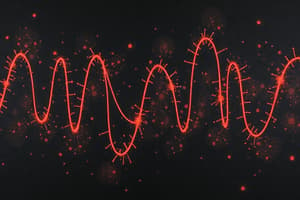Podcast
Questions and Answers
What are graded potentials?
What are graded potentials?
Brief short distance signals within a neuron, short-lived, localized changes in membrane potential.
What are action potentials?
What are action potentials?
Brief long distance signals within a neuron.
Why are graded potentials called 'graded'?
Why are graded potentials called 'graded'?
Because their magnitude varies directly with stimulus strength.
What triggers graded potentials?
What triggers graded potentials?
What happens when you stimulate a single ion channel?
What happens when you stimulate a single ion channel?
Why do graded potentials have a short distance signal?
Why do graded potentials have a short distance signal?
Do graded potentials cause a large or small change in polarization?
Do graded potentials cause a large or small change in polarization?
What does the stimulus strength of a graded potential affect?
What does the stimulus strength of a graded potential affect?
What can graded potentials cause?
What can graded potentials cause?
What is depolarization?
What is depolarization?
What is hyperpolarization?
What is hyperpolarization?
Where do we find graded potentials?
Where do we find graded potentials?
What are sensory receptors?
What are sensory receptors?
What is sensation?
What is sensation?
What is perception?
What is perception?
What happens when a sensory receptor is activated by an adequate stimulus?
What happens when a sensory receptor is activated by an adequate stimulus?
What are mechanoreceptors?
What are mechanoreceptors?
What do thermoreceptors respond to?
What do thermoreceptors respond to?
What do photoreceptors respond to?
What do photoreceptors respond to?
What do chemoreceptors respond to?
What do chemoreceptors respond to?
What do nociceptors respond to?
What do nociceptors respond to?
How do graded potentials and action potentials work together to send information?
How do graded potentials and action potentials work together to send information?
What does multiple graded potentials equal?
What does multiple graded potentials equal?
What does a higher frequency of action potentials indicate?
What does a higher frequency of action potentials indicate?
How does the CNS know the difference between small and large stimuli?
How does the CNS know the difference between small and large stimuli?
Flashcards are hidden until you start studying
Study Notes
Graded Potentials
- Graded potentials are short-lived, localized changes in membrane potential occurring primarily in dendrites or the cell body of a neuron.
- These changes can be depolarizations (less negative) or hyperpolarizations (more negative) and cause current flows that diminish with distance.
- The term "graded" signifies that the magnitude of these potentials varies with the strength of the stimulus, allowing for diverse responses to environmental changes.
- Graded potentials initiate when a stimulus triggers gated ion channels to open, allowing ion flow into the neuron.
- Each activated ion channel enables sodium ions to enter, enhancing depolarization.
- Graded potentials produce small changes in polarization, NOT large shifts in voltage.
- The strength of the stimulus affects both the membrane potential and the distance the signal can travel.
Action Potentials
- Action potentials are long-distance signals in neurons that follow graded potentials.
- A graded potential must reach a threshold of -55 mV to trigger an action potential, marking the transition from local changes to a widespread signal.
Sensory Reception
- Graded potentials occur in sensory receptors and post-synaptic neurons, where they respond to environmental changes (stimuli).
- Sensation refers to the awareness of a stimulus, while perception is the interpretation of its significance.
Types of Receptors
- Mechanoreceptors detect mechanical forces like touch and pressure.
- Thermoreceptors respond to temperature changes.
- Photoreceptors in the retina of the eye respond to light.
- Chemoreceptors react to chemicals in solution, affecting smell and taste.
- Nociceptors signal potentially damaging stimuli, leading to the sensation of pain.
Relationship Between Graded and Action Potentials
- Graded potentials can trigger action potentials; when summed, multiple graded potentials contribute to exceeding the threshold needed to fire an action potential.
- The frequency of action potentials correlates with stimulus strength—higher frequencies indicate stronger stimuli.
- The central nervous system differentiates between small and large stimuli based on the number of neurons stimulated and the frequency of action potentials.
Studying That Suits You
Use AI to generate personalized quizzes and flashcards to suit your learning preferences.



